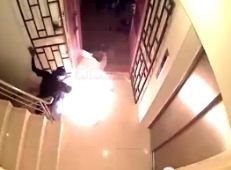Witnesses testify against Raajje TV arson suspect
The trial of the only suspect charged over the torching of the opposition-aligned Raajje TV in October 2013 resumed Monday afternoon with three policemen testifying for the prosecution.

14 Aug 2017, 09:00
The trial of the only suspect charged over the torching of the opposition-aligned Raajje TV in October 2013 resumed Monday afternoon with three policemen testifying for the prosecution.
Mohamed Meead, who was among 18 young men arrested in connection with the arson attack, was serving a lengthy jail sentence for drug trafficking when he was charged with terrorism in October 2015.
The trial has been stalled for nearly 11 months with multiple cancellations.
The last hearing took place in September last year with the prosecution submitting a list of four witnesses, a medico-legal report, and video analysis to show that Meead was the one who lit the fire.
Become a member
Get full access to our archive and personalise your experience.
Already a member?
Discussion
No comments yet. Be the first to share your thoughts!
No comments yet. Be the first to join the conversation!
Join the Conversation
Sign in to share your thoughts under an alias and take part in the discussion. Independent journalism thrives on open, respectful debate — your voice matters.




